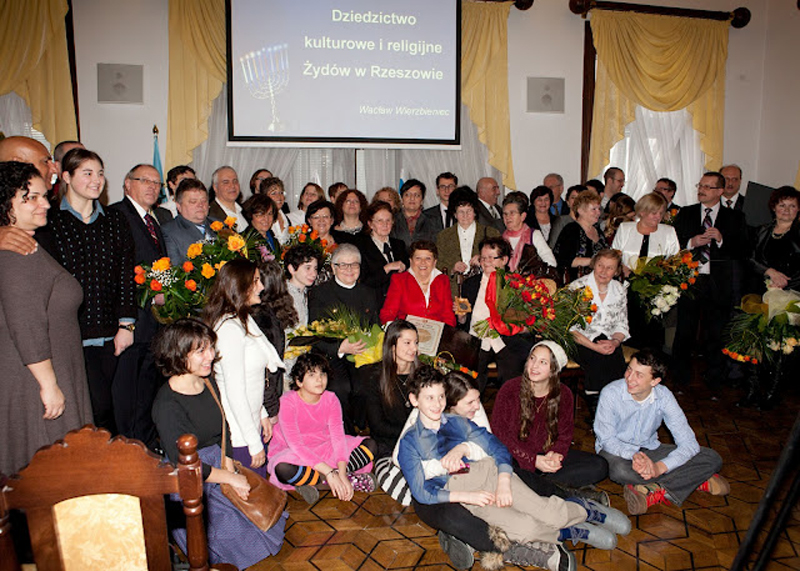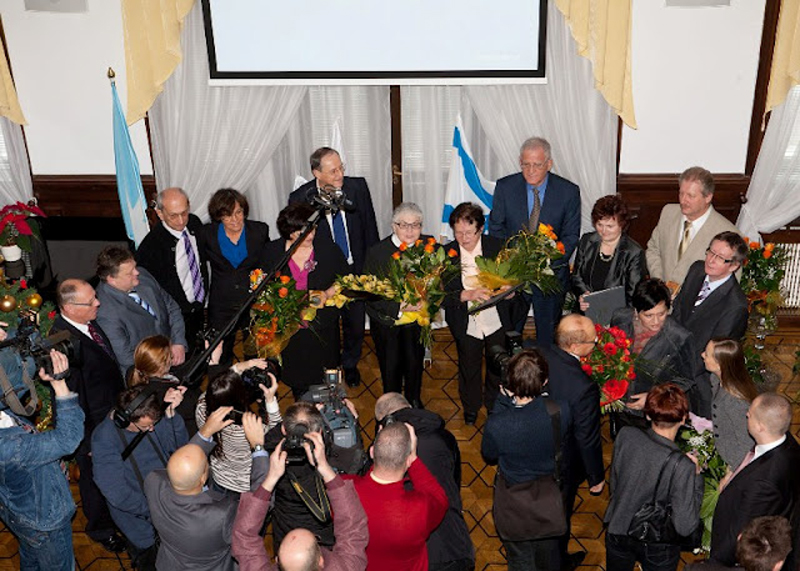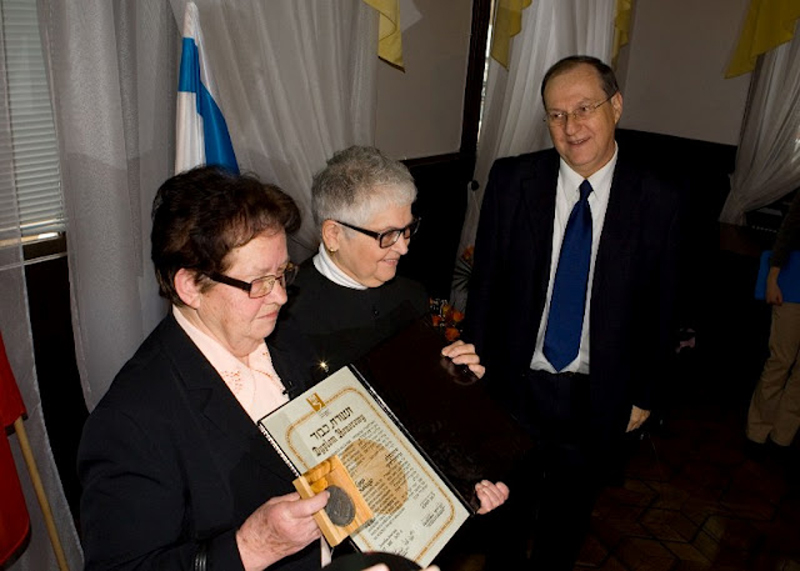- During the trip, my cousin Debbie Goodstein made a film about the story called “Voices From the Attic.” Debbie is currently editing the movie to include footage from our most recent trip, and the movie will be re-released sometime in the future.
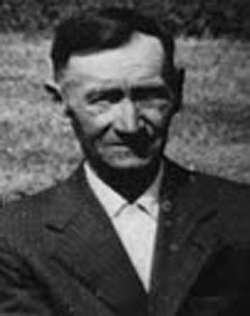
Stanislaw Grocholski
When I was growing up in America, my mother never spoke to me about the Holocaust. Now and then, when my father watched TV movies about World War II, and the extermination of millions of Jews was mentioned, my mother would sit in the kitchen watching with him, tears running down her face. But she never spoke. I didn’t understand why the events that took place in faraway Europe seemed so close to her, but I didn’t even know what questions to ask. I was about 12 when my parents took me to see the movie, “The Sound of Music”. The bad guys in the movie wore armbands that were red with a symbol that looked like a spider. I had no idea who they were, but they scared me just the same. I began to ask my mother questions, and that’s when the first pieces of the puzzle that was her life were offered to me. But not too many were revealed – to me, my mother was the consummate American success story: young, educated, fashionable. If she had an accent, I never heard it. If she had come originally from somewhere else, I never suspected it. If there was a dark story in her past, I never knew it.
The puzzle was filled in slowly over the years. I came to understand that my mother and her sisters, together with their parents, an uncle and his family and some additional bachelor uncles, had spent the war years hidden in an attic in Poland. Details were sketchy. They barely had any food. It was sweltering in the summer, and freezing cold in the winter. They could only speak in whispers, but it was better not to speak at all. They sat curled up in a tiny space that was not high enough to stand up in, but even if they could have stood, they were not allowed to move lest the creaking of the wooden floor give them away. During the two years that they were hidden, two people died in the attic: my mother’s aunt and her young son. Everyone became weak, some were sick. My mother herself was close to dying because she could no longer stomach eating unripe, uncooked potatoes. My grandmother watched her children fading away. Her smallest child, my mother’s baby sister, was slowly dying of hunger, and her crying endangered everyone else. Ultimately, the baby was swaddled in a blanket, carried down out of the attic in the middle of the night, and left on the steps of the local church in the hope that she might be saved – a hope that was not realized. My grandmother spent her time in the attic crumpled in a corner, crying silently to herself.
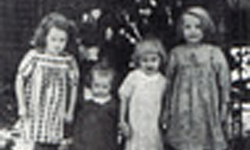
Zofia, Helena, Genowefa, and Anna Grocholski
Hearing these details, I understood why my mother never spoke of her childhood in Poland – she had suffered so much as a child (she climbed up the ladder to that dank and treacherous attic when she was only 6 years old) that she never wanted to relive this black period.
But there was another side to the story: the rescuers. They were unidentified, formless. Who were the people that had hidden my mother’s whole family? Fifteen people in a small crawlspace, hidden and fed for two entire years – who were the people that had saved them? Who were the people to whom I owe my existence?
My first chance to meet them came in 1987, when a good part of my extended family traveled to Poland1. “They” now had names and faces; “they” were Stanislaw Grocholski, his wife, Maria and their family. Mr. Grocholski had passed away by the time we got to Poland, but we did meet Maria and their daughters, sons and grandchildren. We heard a lot of stories on that trip. I understood for the first time how risky it had been for the Grocholskis to shelter my mother’s family – how dangerous it was for Poles to help their Jewish neighbors. It was the first time I became aware that had they been found out, they would have been killed, together with the Jews they were sheltering. Maria, in fact, had been opposed to the plan of hiding the Jews – she had a nervous breakdown during the years those fifteen Jews were huddled in the space directly over her head. It was the first time I heard how many close calls there had been. For instance, in the winter, when virgin white snowdrifts piled up on all the other roofs of the houses in their tiny village, Przeworsk, the roof of the Grocholski’s house remained naked and exposed. The body heat of the fifteen Jews – the contraband in the attic – melted all the snow. Had anyone looked up and understood, the Grocholskis would have been slaughtered. Mr. Grocholski spent two years keeping the secret not just from his neighbors, but from his children as well. His four small daughters were never told what was going on, for fear that they might slip and reveal the dark secret to someone who could betray them. In fact, when we were in Poland in 1987, their unbelievable bravery was still a secret; they were still afraid to tell the story to their Polish neighbors, who – forty-five years after the fact – might have retaliated against them for helping Jews.
We also heard what a struggle those two years had been for our rescuers. Mr. Grocholski trudged up the ladder to the attic every day with heavy pails: in one, he took down the accumulated waste of the fifteen clandestine people; in another, he brought them whatever small amount of potatoes or beans the family could give them. When the baby in the attic cried, Mr. Grocholski hit his own baby daughter, Genia, to cover up the noise. There were times when the family had no food to give the Jews huddled in the crawlspace; there were other times when it became so dangerous to hide them that Mr. Grocholski wanted to give them up – but in the end, he never did.
- 1. 1
In the following years, my mother’s older sister and her husband, Sally and Kenny Frishberg, pressed to have the Grocholskis acknowledged as Righteous Among the Nations. Finally, two months ago, on January 17, 2012, in a very distinguished and emotional ceremony held in the city of Rzeszow, Poland, Stanislaw Grocholski was recognized as one of the Righteous. Twenty-four members of my family from the United States, plus another three from Israel, flew to Poland to attend the ceremony, pay their respects and honor him. We were reunited with the Grocholski family, and this time we heard even more details of the harrowing years between 1942 and 1944. We heard that Maria Grocholski had had stomach problems during the whole period caused by the stress of sheltering my mother’s family. She got pregnant during the war, but anxiety caused her to miscarry and lose the baby. The Grocholski’s four daughters, unbeknownst to their parents, knew something was going on in the attic; they were able to see shadows over their heads and the movement of black shapes through the wooden slats of the ceiling. They knew enough, though, never to speak of this. And regarding the lack of snow on the roof, apparently there were Polish neighbors who suspected the truth, but there was a conspiracy of silence among them to keep the Nazis from finding out.
The Grocholski family, twenty-five years after our original visit, and now seventy years after the events of the war years, is finally able to be truly and openly proud of their great deed. The attitude in Poland today concerning the Jews, and the rescue of the Jews during the Holocaust, has changed for the better. The ceremony was broadcast by the Polish media, and there was a slew of articles in various newspapers that covered the story.
The Yad Vashem website states, “In a world of total moral collapse during the Holocaust, there was a small minority who mustered extraordinary courage to uphold human values. These were the Righteous Among the Nations. They stand in stark contrast to the mainstream of indifference and hostility that prevailed during the Holocaust. Contrary to the general trend, these rescuers regarded the Jews as fellow human beings who came within the bounds of their universe of obligation.” These grand words go only part of the way in telling the story. The Righteous put their lives at risk to help Jews – people they didn’t always like, people they sometimes resented, people they often blamed for killing Christ, people who could give them nothing in return – but people whom they acknowledged as people: hunted people who desperately needed help. In meeting the people who rescued my family and hearing their stories, the power of the description became very real to me. The courage that was shown by Stanislaw Grocholski truly was an extraordinary thing. These are the stories that affirm our faith in the human race.




